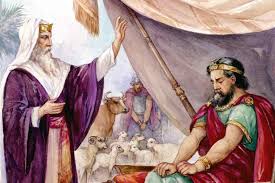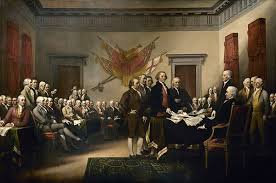For over a month we have been riveted by the unfolding stories from the 1st and 2nd books of Samuel. Samuel comprises one book, later divided into two – and forms part of the Deuteronomic history, a history focused on the ups and downs in the relationship between Isreal and Yahweh. The storyline in Samuel covers the period of transition Ancient Israel from a confederation of tribes towards becoming a unified nation ruled by a king.
As we heard last week, this was a chaotic and tension-filled transition. Samuel, the last of the Judges is now the king-maker and without telling Saul he secretly anoints David as king in his place. Saul becomes increasingly suspicious of David and is jealous of David’s growing popularity.
Last week’s reading also introduced the relationship between David and Jonathan, who at their first meeting experience love at first sight!
When David had finished speaking to Saul, the soul of Jonathan was bound to the soul of David, and Jonathan loved him as his own soul.
In today’s installment, we skip forward to listen as David learns of Saul and Jonathan’s death; father and son together having taken the last stand in battle against the Philistines. David’s response to the news of the deaths of Saul and Jonathan is to compose one of the great love eulogies of all time. He cries out in anguish –
see how the mighty have fallen ……I am distressed for you, my brother Jonathan; greatly beloved were you to me; your love to me was wonderful, passing the love of women, How the mighty have fallen, and the weapons of war perished!
***
Issues of gender and sexual identity continue to fuel our current culture wars making for an interesting answer to the question: were David and Jonathan in a homosexual relationship, or were they just platonic, Oxbridge-style soul-friends; the kind of tortured attraction between men characterized in the novels of E. M Forster and Evelyn Waugh; men desiring one another while keeping it in their pants so to speak, or in David and Jonathan’s case, under their kilts?
Biblical commentators under the influence of a traditional homophobic reading of this story have over the centuries gone to considerable lengths to deny any homosexual inference in the love that David openly declares for Jonathan. The difficulty that has confronted such commentators is how to interpret this love poem in fraternal terms that avoid its clear homophilic (love between men) or even homoerotic (sex between men) content.
Contemporary liberal commentators no longer directly deny the homophylic or homoerotic content of this text. However, many take refuge in their concern to avoid the danger of anachronism. Anachronism is where we project back into history our current attitudes, values, and ideas. There is, however, a growing body of commentators committed to a queer reading of this text (Bruce Gerig) who openly embrace the homosexual nature of the love between David and Jonathan.
David and Jonathan are clearly an emotionally bonded couple. From their first meeting, Jonathan places his love for David above his loyalty to his own father- a very big statement in a patriarchal society. On a number of occasions, Jonathan protects David from the dangers of Saul’s murderous paranoia.
On the face of it, by declaring that Jonathan’s love is love beyond that of a woman, David, the inveterate womanizer, makes it clear that there is a homoerotic component to the love between them.
I share the view that the love between David and Jonathan appears to be certainly homophilic if not homoerotic in nature. So some ask, were these great historical figures gay?
***
Gayness is the recognition of homosexuality as a stable emotional, developmental state existing along a continuum of sexual identification and gender attraction.
It is, therefore, a completely modern concept. The Bible, whether here or elsewhere has no concept other than that all men are ‘heterosexual’.
I place the term ‘heterosexual’ in inverted commas, Like homosexual, it’s a term that conceives a variety of possibilities along a developmental continuum. Biblical writers had no conception of a continuum of different possibilities.
In the Biblical worldview, normative sexual identity was capable of distinguishing between the duties of procreation and the pursuit of pleasure; the latter holding the potential for what today we recognize as homosexual as well as heterosexual object choices.
The term homosexual comes from the Greek homos meaning the same, rather than the Latin homo meaning man and was first coined in mid-19th-century Germany. Thus, to read a modern concept of homosexuality – gayness or heterosexuality back into the relationship between David and Jonathan is anachronistic. The terms homosexual and heterosexual, and the distinctions they imply are products of the modern age.
David and Jonathan were not gay in the sense that I am, for instance, gay. The love between David and Jonathan is the sexually charged love common in intensely patriarchal-warrior cultures, evidenced in such cultures as diverse as those of Classical Greece and Samurai Japan. In these tribal-warrior cultures, the social and emotional inferiority of women was so great that while suitable as the bearers of children, women could not be considered as emotional partners with men.
These were in the general sense homophilic societies where the primary emotional identification for men could only be other men – a man’s men’s world. In such a world there is a discrete tolerance for men having sex with men, usually involving age difference relationships between older and younger men. Our social concept of homosexuality as a stable emotional developmental state, existing along a continuum of identity and gender fluidity has little relevance when reflecting on men’s sexual arrangements in such societies.
***
Therefore, is there value in this story for us as 21st-century readers? I think it warns us to be careful in our assumptions of the Biblical past. We need to question the assumption that in the patriarchal past, same-sex relationships were always forbidden. The predominant Jewish anxiety about homosexuality, evidenced in the early texts of the Torah, is rooted in a tribal society’s concern about diverting sexual energy away from procreation; babies meant survival. Yet, in societies where the primary emotional identification is between men and not between men and women, erotic expression was clearly tolerated. Thus, the Bible itself is a very unreliable witness to call in the attempt to use it to prohibit modern same-sex relationships.
The Anglican tradition of interpreting Scripture understands that interpretation shifts as each generation encounters the text from within the challenges of their own time and place. Anglican tradition accepts that meaning emerges in the dynamic of an encounter between interpreter, community, and text. As we encounter this ancient story, what are the questions we might bring to bear on this text?
Although there will always be dissenters, the prevailing Western view in the 21st-century is of sexual development in as a psychologically and environmentally driven, developmental process. Along the continuum of possibilities of sexual and gender identity, no one position is preordained for every person. Even biological gender is no longer considered the sole determinant of gender identity because as we are increasingly coming to accept, identity is a psycho-spiritual issue and not simply a matter of chromosomes.
So much for psychology and environment, but what about theology.
The story of David and Jonathan reminds us that the theology of human relationships rests not upon issues of gender but on the experience and expression of love.
Love as emotional commitment and ethical fidelity is the theology that underpins the experience of a love relationship between significant others.
We may be biologically gendered for the purposes of reproduction, yet, this cannot be the final statement on either the purpose of sex or what it means to be made in the image of God.
God, despite the frequent use of the male pronoun, is non-gendered. Male and female are not terms we can ascribe to God. Yet, animus and anima are. These principles of masculine and feminine energy are central characteristics of the divine. When thought about in these terms the masculine element of creating comingles with the feminine elements of receiving and sharing – as God the lover beholds God the beloved, and God the love sharer.
For 21st-century Christians, it is no longer the gendered identity of the object of our desires that matters, but the integrity of the love that comes to bind two persons in a relationship that is of primary significance for both. The longing that characterizes such relational love- the giving, the receiving, and the sharing of love is a direct reflection of the divine nature and is the keenest indicator we have of our longing for God, and the longing God has for us.
blessed be the longing that brought you here
and quickens your soul with wonder.
may you have the courage to listen to the voice of desire
that disturbs you when you have settled for something safe.
may you have the wisdom to enter generously into your own unease
to discover the new direction your longing wants you to take.
may the forms of your belonging – in love, creativity, and friendship –
be equal to the grandeur and the call of your soul.
may the one you long for long for you.
may your dreams gradually reveal the destination of your desire.
may a secret providence guide your thought and nurture your feeling.
may your mind inhabit your life with the sureness
with which your body inhabits the world.
may your heart never be haunted by ghost-structures of old damage.
John O’Donohue


 Samuel’s choice was very predictable. Swayed by Saul’s appearances – tall, dark and handsome, Samuel anoints him king. Like many seemingly strong leaders, Saul’s narcissism is on the surface at least, attractive and impressive. He cuts a large swagger, is a big presence, and the people mistake this for real strength. Yet, like all narcissists, he’s a big man with a fragile ego. He is quick to take offense, has poor anger management control, and increasingly becomes more paranoid and vindictive. Despite initial successes, it works out badly for Israel under Saul, and it works out very badly for Saul himself.
Samuel’s choice was very predictable. Swayed by Saul’s appearances – tall, dark and handsome, Samuel anoints him king. Like many seemingly strong leaders, Saul’s narcissism is on the surface at least, attractive and impressive. He cuts a large swagger, is a big presence, and the people mistake this for real strength. Yet, like all narcissists, he’s a big man with a fragile ego. He is quick to take offense, has poor anger management control, and increasingly becomes more paranoid and vindictive. Despite initial successes, it works out badly for Israel under Saul, and it works out very badly for Saul himself. surprise, God passes over all the virile sons of Jesse until it seems he has run out of options. But there is one son remaining and when he is summoned he appears to be a boy with ruddy cheeks and bright eyes.
surprise, God passes over all the virile sons of Jesse until it seems he has run out of options. But there is one son remaining and when he is summoned he appears to be a boy with ruddy cheeks and bright eyes. of the American Constitution feared the people’s demand – give us a king, for there were many who at the time thought General Washington would make a fine king.
of the American Constitution feared the people’s demand – give us a king, for there were many who at the time thought General Washington would make a fine king.
 In the E-News Epistle which came out on Thursday, I made a very bold statement indeed. I said:
In the E-News Epistle which came out on Thursday, I made a very bold statement indeed. I said: Mark offers us a rather uneventful story of the farmer who sows his seed by a rather careless method of scattering it, willy-nilly. He then forgets about it, getting on with his life, trusting in God’s goodness in creation to do the rest. The seeds sprout and fruit,
Mark offers us a rather uneventful story of the farmer who sows his seed by a rather careless method of scattering it, willy-nilly. He then forgets about it, getting on with his life, trusting in God’s goodness in creation to do the rest. The seeds sprout and fruit, 


 The first lesson for this Sunday, the call of Samuel, is set in an age when: t
The first lesson for this Sunday, the call of Samuel, is set in an age when: t